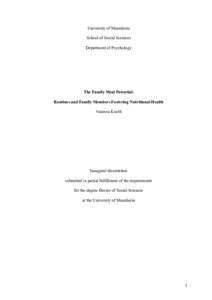|
The family meal potential: Routines and family members fostering nutritional health
Knobl, Vanessa
![[img]](https://madoc.bib.uni-mannheim.de/69513/1.hassmallThumbnailVersion/Dissertation_Vanessa%20Knobl.pdf)  Vorschau |
|
PDF
Dissertation_Vanessa Knobl.pdf
- Veröffentlichte Version
Download (12MB)
|
|
URN:
|
urn:nbn:de:bsz:180-madoc-695139
|
|
Dokumenttyp:
|
Dissertation
|
|
Erscheinungsjahr:
|
2025
|
|
Ort der Veröffentlichung:
|
Mannheim
|
|
Hochschule:
|
Universität Mannheim
|
|
Gutachter:
|
Sonnentag, Sabine
|
|
Datum der mündl. Prüfung:
|
2025
|
|
Sprache der Veröffentlichung:
|
Englisch
|
|
Einrichtung:
|
Fakultät für Sozialwissenschaften > Gesundheitspsychologie (Mata 2015-)
|
|
Fachgebiet:
|
150 Psychologie
|
|
Freie Schlagwörter (Englisch):
|
family meals , nutritional health , children , parents
|
|
Abstract:
|
Frequent family meals are positively associated with children’s nutritional health. Thus, they represent a critical dietary environment for the prevention of non-communicable diseases such as obesity. Beyond meal frequency, the way how families eat together and plan such meals also appear to be highly important for nutritional health outcomes. This dissertation examines the role of family mealtime routines, parental influence as nutritional gatekeepers and role models, and children’s food preferences in shaping the nutritional health of families. To address these research questions, I examined associations between key steps of the family meal process (planning, purchasing, preparing and eating meals) and the nutritional health of both children and parents, utilizing diverse methodological approaches and outcomes, particularly emphasizing family meals as social environments and children as active agents.
In Manuscripts 1 and 2, we examined how mealtime routines influence children’s fruit and vegetable intake. In Manuscript 1, 50 parent-child dyads attended two laboratory dinners to test the causal effects of meal duration on children’s dietary intake. One session matched their typical family mealtime duration; the other extended it by 50%. Results showed that longer meals led to significantly higher fruit and vegetable intake in children but not increased consumption of bread or cold cuts.
In Manuscript 2, we assessed the role of mealtime routines in daily family life, their interrelations, and their predictive effects on children’s nutritional health. Over seven days, 310 parents reported on their daily family meal. Results confirmed consistent reporting of key routines, such as a positive atmosphere and avoidance of TV or smartphone use, across most meals. Weak intercorrelations among the seven routines suggested they represent distinct constructs. Parental modeling and a positive atmosphere remained significant predictors of children’s fruit and vegetable intake. These findings highlight the importance of not only how often families eat together but also how they do so, emphasizing mealtime duration, atmosphere, and parental modeling as most crucial for children’s nutritional health.
In Manuscript 3, we investigated how parents’ knowledge of nutrient content (sugar, salt, and fat) in food products relates to their family’s long-term nutritional health. A total of 508 parents, who report to be primarily responsible for meal planning, completed an at-home interview, including a questionnaire and a nutrient estimation task for nine food products. Additionally, the parent and one child were weighed and measured. Results showed that parents consistently misestimated nutrient content. General numeracy predicted more accurate salt estimations, while nutrient awareness was more relevant for sugar and fat estimations. No significant associations were found between nutrient underestimations and BMI or health conditions. These findings suggest that while parents struggle to accurately estimate nutrient levels, this (missing) knowledge alone does not exert a stable influence on health outcomes. This implies that food choices are also shaped by other factors, such as for example children’s preferences, and not primarily by parental nutritional knowledge. Manuscripts 4 and 5 further explore this dynamic, focusing on the role of children’s preferences in shaping healthy and sustainable family meals, with preference for meat examined as a key outcome.
In Manuscript 4, we explored generational differences in dietary preferences and their impact on family meals. Surveys of 500 adolescents and 500 adults from their parental generation assessed food-choice motives, dietary styles, and advocacy for sustainable food practices. Adolescents were three times more likely than parents to abstain from meat. Although they were not more likely than adults to advocate for reduced meat consumption at family meals, they were more likely to promote reducing other animal products and introducing plant-based options. Adolescents with strong sustainability motives, reflected in their dietary habits, were also more likely to advocate for sustainable family meals.
In Manuscript 5, we examined 57 parent-child negotiations on the amount of meat in a shared family meal in a videocall, focusing on generational influence and determinants of the amount of meat decided on. Both generations were found to have equal influence on the final meat content of the meal. However, when children were non-meat eaters or when dyads reported prior conflicts about meat consumption, they agreed on significantly less meat for the meal. These findings highlight a) the active role of children in meal planning and their potential to influence healthier, more sustainable family meals, but also b) the importance of psychological variables such as motivation, values, and behaviors over demographic affiliation.
In sum, this dissertation highlights the potential of family meals as a social eating environment for promoting children’s nutritional health. Both the critical role of mealtime routines and the unique role of children as active advocates —often overlooked in previous theories—were underscored, emphasizing the need for future research and consideration in interventions. By utilizing diverse methodological approaches and examining family meals as a process from planning to eating at the table, I gained practical insights and endorse family meals as an invaluable context for fostering nutritional health in families.
|
 | Dieser Eintrag ist Teil der Universitätsbibliographie. |
 | Das Dokument wird vom Publikationsserver der Universitätsbibliothek Mannheim bereitgestellt. |
 Suche Autoren in Suche Autoren in
Sie haben einen Fehler gefunden? Teilen Sie uns Ihren Korrekturwunsch bitte hier mit: E-Mail
Actions (login required)
 |
Eintrag anzeigen |
|
